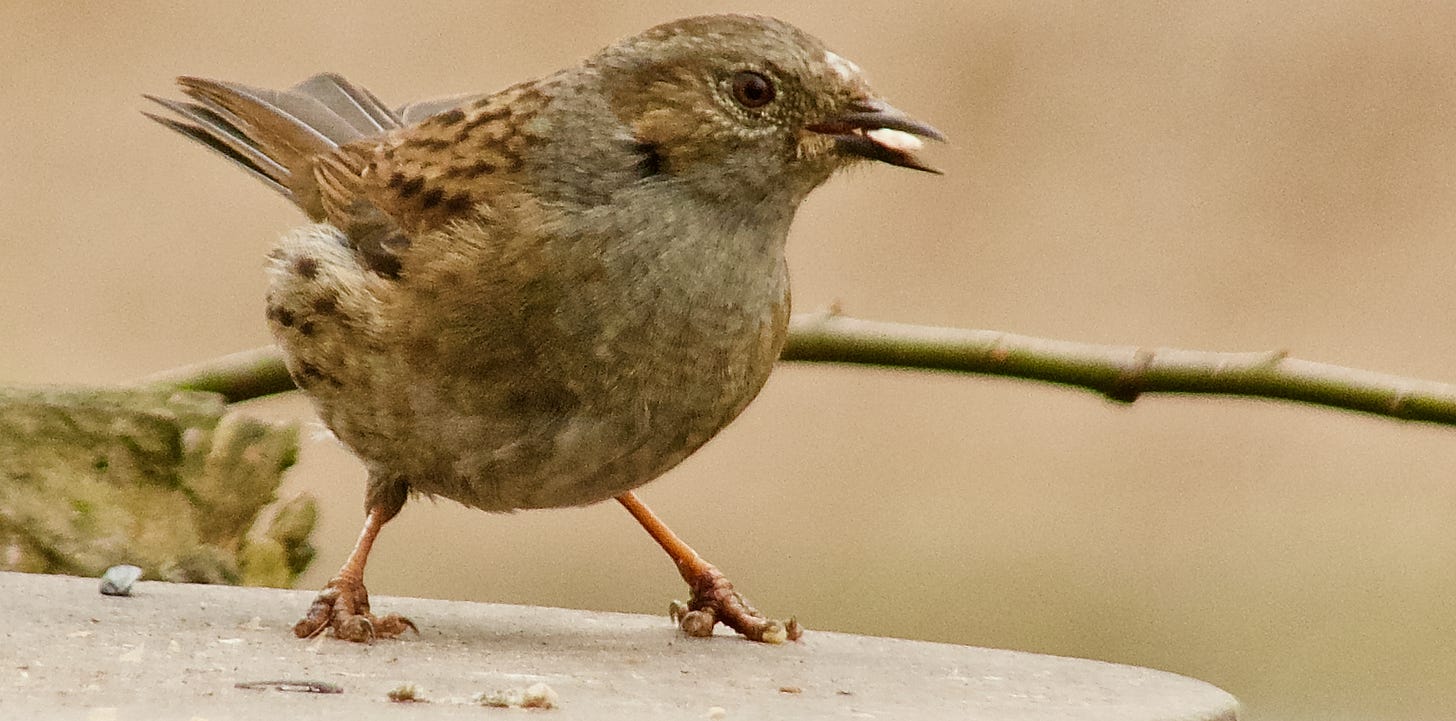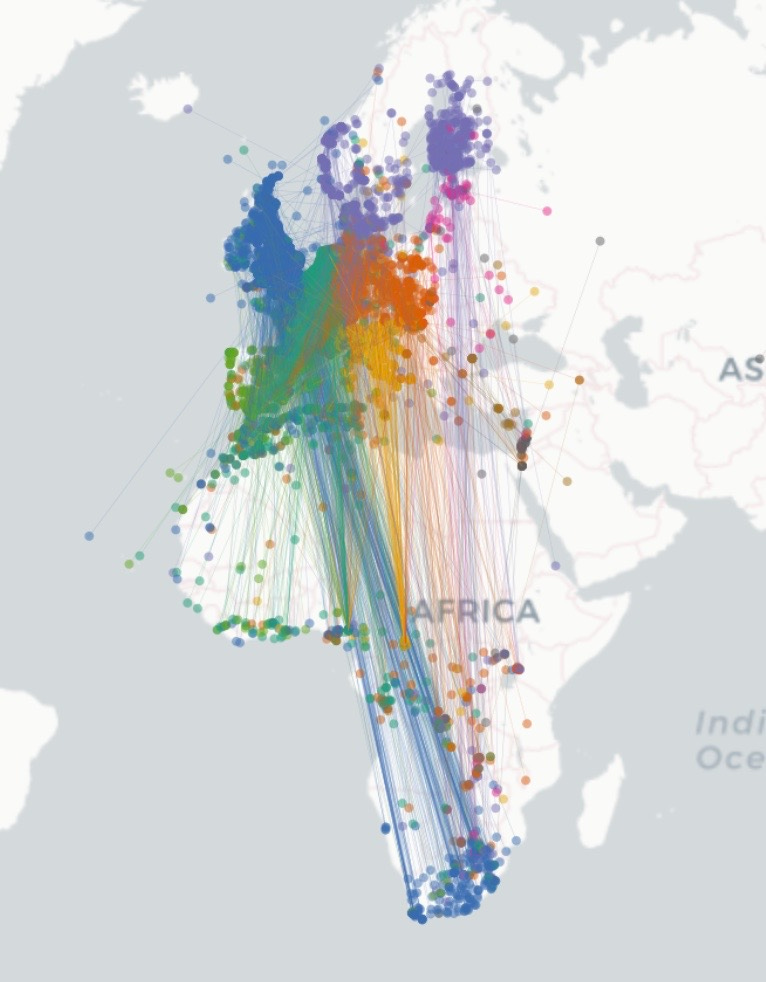I’m easily pleased. It’s one of the joys of being a birder.
Take the dunnock.
The dunnock is an unexceptional small brown bird. The original little brown job. It’s in the name. ‘Dun’ is of course ‘brown’, and the ‘ock’ bit merely a diminutive.
Some little brown jobs – the nightingale is the prime example – make up for their unremarkable appearance with rich and varied song.
Not the dunnock. Its song is a sort of indeterminate jangle. Nice enough, and quite cheering in its own way, but not the stuff of poetry.
As I say, there really is nothing exceptional about the dunnock.
BUT.
There’s the grey around its head – catch it in the right light and it has a tinge of blue. Nice, and unexpectedly subtle.
There’s the streaking on its back – again, a hidden feature, the kind of thing to please a connoisseur.
And there is, most famously if you move in the right circles, its sex life.
Plus, it’s a bird, and birds are great. So, taking all those things into account, every time I see a dunnock, I say “Ooh, dunnock.” It’s the rules.
But the dunnock isn’t the point of this. It was a sideshow. The real bird, the bird of birds, came as a result of the dunnock.
(I’m aware that we might be reaching semantic satiation with the word 'dunnock'. Just three more instances, I promise.)
The dunnock (one) was there, as they often are, hopping up to the top of the bush, giving a burst of song then popping back down. An everyday occurrence – pleasing, normal, the kind of thing to help you forget for a few seconds that the wind is rather stronger than you’d bargained for and your left shoe has sprung a leak. I watched it for a few seconds, then hung around for a minute just to see if it would pop back up.
And if I hadn’t done that, I wouldn’t have stopped for another minute to look out at the expanse of sea beyond it, contemplating (as I usually do on such occasions, if only briefly) its size, my smallness, and from there the vastness of All Existence and our minuscule part in it all.
And if I hadn’t been engaged in that thought I wouldn’t have been distracted by the little darting movement – so fleeting I thought I might have imagined it – on the rocks below, and I wouldn’t then have spent five enjoyable but ultimately fruitless minutes trying to relocate the little darter in a game of monochrome Where’s Wally? (I’m pretty sure it was a rock pipit).
And if I hadn’t done that I wouldn’t still have been on the coastal path about ten minutes later than scheduled, and would have already been heading inland towards coffee and cake.
And if I’d done that, the swallow wouldn’t have flown over my shoulder.
The rhythms of the year have their markers, and among the most resonant is the sighting of the first swallow. It might not make a summer, one swallow, but it’s a step in the right direction – even if this one’s arrival seems to have ushered in, several months early, a vicious autumnal storm.
The swallow is – with apologies to the dunnock (two) – not an unexceptional bird.
Just there, it was, for that brief instant. Just there, no more than five yards away. And then it jinked to the left and up and right and jink again and gone. No time to chat, sorry. Knackered.
I empathise. If I’d just flown from South Africa I’d be the same.
How easily we say those words. "Flown from South Africa." The ease of them is in inverse proportion to the difficulty of the journey.
I did an interview yesterday evening, the first I’ve done for Taking Flight (which comes out, as I think I’ve mentioned before in this and other spaces, on May 4th). It was with David Lindo, aka The Urban Birder, as part of his series ‘In Conservation With’ (it’s a pun, not a typo, as I’m sure David is very tired of pointing out).
At the end, David asked me a question. It was a good question, and one I hadn’t thought much about, but he did at least give me warning, in the pre-chat chat, that he was going to ask it, so I’d had a bit of time to think of an answer.
But what came into my head when he did eventually ask it was something different.
The question was this: if I could fly, what or where would I want to fly over?
Possible answers included the Grand Canyon, London, a starling murmuration, Alaska, and plenty more. But as I started to answer I remembered a story Chris Hadfield told about life on the International Space Station.
At the beginning, he said, as the station did its 90-minute pass over Earth, each astronaut would look for, and point out, their home town. As time passed, the novelty of this wore off, and they took to noting ever wider areas: a state, a country, a continent. And after a while, with the perspective of repeated experience – and what an experience it must be – they began to perceive Earth in its entirety.
Hadfield has often talked of his ‘privilege of perspective’ – to be able to see the whole planet, not just your own small bit of it. He’s also suggested – gently, politely, as befits a good Canadian – that our politicians – and, by extension, us – might benefit from such an experience.
I feel a tiny connection with that perspective whenever I see a migrating bird arrive in Britain. Those journeys, millions and millions of them, undertaken every year. Unfathomably long and dangerous, made for the benefit of the species, driven by genetic imperative. The swallow doesn’t question the reason for the journey – it just makes it. The cost to the individual might be death, but for the species as a whole, migration works.
Whenever I see the first one, I think of the journey it’s made, what it’s seen, what it’s endured. And through that I get a sense – the smallest and sketchiest sense, admittedly – of the whole world, as seen through the eyes of a small bird.
So thank you, swallow. And thank you, by extension, dunnock (three).
As I say, I’m easily pleased.
Mention of Chris Hadfield and the International Space Station seems appropriate today, the 62nd anniversary of Yuri Gagarin’s journey into space. You can read the letter he wrote to his family two days before that flight on Shaun Usher’s excellent Letters of Note.







This is just wondrous. Brightened my whole outlook on the day. Thank you. 😊😊
You write exquisitely! I happened upon this article as I blundered around in Notes for the first time (still finding my way around all that is Substack). Thank you for sharing your words!